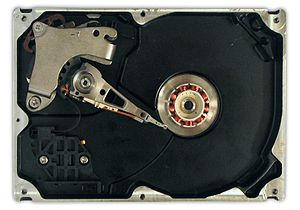[responsivevoice_button]
It’s the single biggest technology mistake Small Businesses make.
They use email. They surf the web. Computers are cheaper than ever, so everyone in the office has a pretty decent one. And more (though still not *most*) Small Business computers have an anti-virus program running, and some sort of firewall, on the computer itself, or at the Internet connection guarding the entire office.
So while a greater number of machines are protected against intrusion or infection, few are protected against failure. Hard drive crash. Power surge. Even accidental deletion of irreplaceable data.
 Given the past few years, it’s easy to get caught up in, well… fear – especially when credit card companies and government agencies are routinely compromised.
Given the past few years, it’s easy to get caught up in, well… fear – especially when credit card companies and government agencies are routinely compromised.
But let’s be practical: your Small Business is in much greater danger of a critical computer dying because of mechanical failure or human error, than it is of being damaged irreparably by a malicious program.
Your data IS your business: it’s the reason your Small Business even has any computers, unless you make them or repair them. Creating, storing, sharing, and manipulating information – “data”, in geekspeak – is what computers do for all businesses, regardless of their size or trade.
We’re all doing a better job protecting our data *from* – identity thieves, viruses and worms, prying eyes. But how well are we simply protecting our data?
Anybody out there that has ever had the hard drive of an essential computer die understands completely the importance of data protection. And even those of us who haven’t actually experienced this can easily imagine the disaster this could be. Yet, time and again, the important information upon which Small Businesses depend is left to chance, luck and the hope that nothing goes wrong.
It’s a shame, but the number one way I meet new Small Business clients is potential data loss situations. The smaller the business, the more likely they have no backup at all.
Fortunately, most of these cases have been “near misses”, but I dread the scenario when I have to tell a Small Business owner there is nothing I can do, because the disk is dead beyond restoring, and they have NO BACKUP to retrieve data from.
So what’s the problem. More usefully, what’s the *solution*? In my experience, the problem is two-fold: understanding what to backup, and finding a way to backup data that isn’t so complicated that you eventually stop doing it.
These factors aren’t that tough to resolve, given the proper experience and insight. Both of which I will share with you in the next few posts which, when finished, should help you actually back your stuff up.
And avoid that fatal, OM%G disaster…
peace







